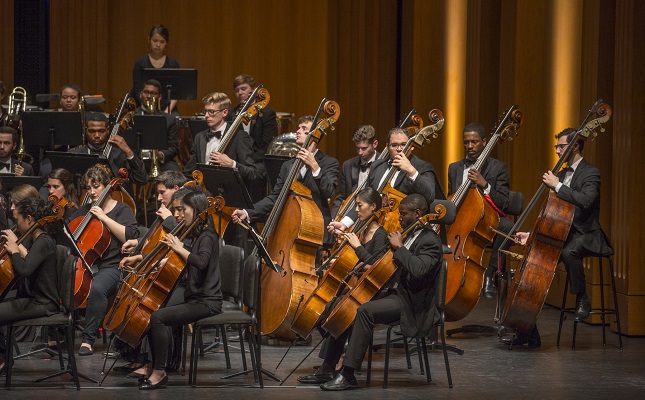A new cello concerto by Grammy-nominated vocalist, flutist, and composer Nathalie Joachim will premiere during the Spoleto Festival USA Orchestra’s concert on Saturday, June 1. A co-commission with the New York Philharmonic, Orchestre Métropolitan, and Chautauqua Institution, Had to Be is Nathalie’s first foray in composing for full orchestra and soloist.
Had to Be, a three movement work written for acclaimed cellist Seth Parker Woods, playfully and assertively disrupts existing conventions of Western classical concert music by undeniably infusing it with Black musical style. Had to Be taps into the rich history of Black global freedom movements connected to stylistic expression, using Black dandyism, a fashion movement that defies a monolithic understanding of Black masculinity, as a point of conceptual departure.
Each portion of the work approaches this idea from various lenses in the African musical diaspora, creating a broader sonic geography that itself is a statement on style’s connection to freedom. The work’s first movement, Homegoing, opens with an offstage band that borrows from the celebratory funeral marches observed throughout the Caribbean, while nodding its head at the second line traditions of New Orleans.
The movement itself immediately subverts the convention of a concerto as a modality that uplifts a singular entity by having its opening statement derive from a musical practice inherently rooted in collectivity – an honoring not simply of the loss of a singular life, but of the departed’s rebirth into a new spiritual phase that is carried forward by shared consciousness. The entire movement is underpinned by a hymn that intertwines with soulful melodies delivered by the soloist, an homage to Black American faith traditions.
Flare, the second movement, takes us to the audacious jazz of early 20th century Harlem and to the polyrhythmic lilt indigenous to the music of West Africa all at once. It invites the orchestra, with bold brass and woodwind statements and ecstatic articulations in the percussion and strings, to dance alongside the soloist in exaltations that are undeniably swung without actually swinging – unexpected statements that defy squareness altogether and contribute to a pulse that is evasive and intoxicating.
The final movement, With Grace, is post-minimalist in its leanings, drawing inspiration from the likes of Julius Eastman in that it repeats poetic incantations, continuously applying pressure until obliging in a satisfying release. Meanwhile, the soloist resists the pull of this by making an angelic and prayerful ascent throughout.
Overall, Had to Be, like its inspirations, is positive, prideful, and radical all at once. It represents the perpetually colorful and complex intersections between race, class, gender, power, and style. It honors what it means to be Black and continuously choosing to be free.
Purchase tickets to the Mahler’s Fifth concert featuring Nathalie Joachim’s world premiere concerto here.

